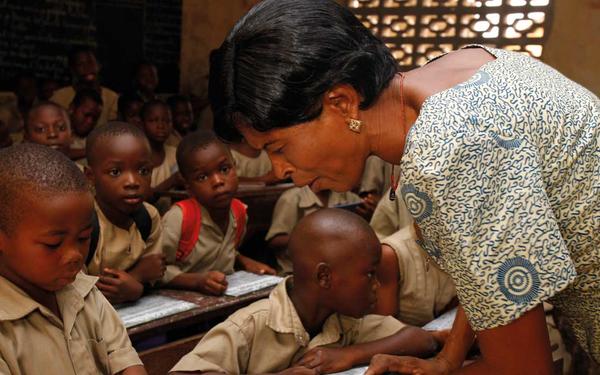Professor Douglas Bourn on why teachers matter
Professor Douglas Bourn discusses our recent report which which includes observations from leading educational figures in the UK and internationally such as Tim Oates, Colleen McLaughlin, Pasi Sahlberg, Lucy Crehan, and Alison Peacock.

Teachers are the greatest asset any government can have in promoting educational reform and improvement,’ says Charles Clarke, former Secretary of State for Education under the last Labour government, in his Foreword to the recently published Education Insights from Cambridge: From Policy To Pupil: why do teachers matter?
This important report, which includes observations from leading educational figures in the UK and internationally such as Tim Oates, Colleen McLaughlin, Pasi Sahlberg, Lucy Crehan, and Alison Peacock, raises issues about the role and importance of teachers in areas such as teacher autonomy, the role and image of teachers and professional development.
The report explores a wide range of views such as what is meant by teacher autonomy, the importance and role of the curriculum and the use of textbooks. Whilst the report mentions the broader social purpose of teaching, I feel there is an opportunity to build on this discussion. Many people come into teaching because they want to make a difference in the world, to be agents of social change. Alison Peacock talks about teaching being an intellectual endeavour and others make reference to improving the status of the profession, but it’s also worth noting about how teachers can be given the support and resources they need to make a difference, rather than just giving pupils the knowledge and skills to pass exams. From 2012 to 2017 I had the privilege to be involved in the UK government funded programme on Global Learning. One of the reasons this programme was successful and engaged over 8,000 schools in England was that teachers saw this area of learning as having a social purpose that went beyond just reproducing bodies of knowledge.
This agenda seems even more important today with the Sustainable Development Goals and the ways in which societies and communities are responding to globalisation. The Sustainable Development Goals put a priority on moving from access to quality in education. But what does this mean around the world? Quality means referring to not only what is taught but also how a subject is taught. Pedagogy is mentioned in the report but only Alison Peacock relates this to learning about real world issues. The Sustainable Development Goals provides a major opportunity because it links approaches to learning to content. Target 4.7 of the Goals states:
By 2030 ensure all learners acquire knowledge and skills needed to promote sustainable development, including among others through education for sustainable development and sustainable lifestyles, human rights, gender equality, promotion of a culture of peace and non-violence, global citizenship, and appreciation of cultural diversity and of culture’s contribution to sustainable development
Globalisation poses major challenges for teachers around the world both in terms of what they teach and how they teach.
Some of the contributions allude to these themes, but there is a need to look more broadly at the purpose and role of education. While, for example, there may be support from many educationalists for teacher autonomy, many societies do not allow this, and even those that say they do, often have very prescriptive approaches to the curriculum and what should be taught in schools. The UNESCO Global Education Monitoring Report of 2017/18 on Accountability in Education noted, for example, that in most educational systems the role of teachers was seen as primarily the transmission of knowledge with the priority being in the perceived core subjects of language, mathematics and sciences.
Discussions on what and how subjects are taught in classrooms need also to take account of the changes that have taken place in many societies that have enabled instant access to knowledge, the influence of social media and the broader influences of globalisation. The report discusses this to some extent in relation to Information Technology, but in addition, recent social and political changes in North America, Latin America and Europe could be said to be directly influenced by the impact of globalisation. Understanding the impact of global forces, be they economic, social or cultural, on learners’sense of identity and role in the world have to be priorities for all education systems. Teacher development to me means preparing teachers for working in these challenging global times we are living in. One of the contributions, from Professor Ee-Ling Low, makes reference to equipping teachers to be ‘locally rooted- but globally minded’. Too often the ‘local voice’ is lost in an economically driven global agenda. Being part of a global society and economy for educationalists has to mean much more than good performance in league tables. It has to be about equipping the teachers with the knowledge and skills and values that sees learners of today and tomorrow as global citizens, who can make a difference in the world.
Professor Douglas Bourn
UCL Institute of Education




